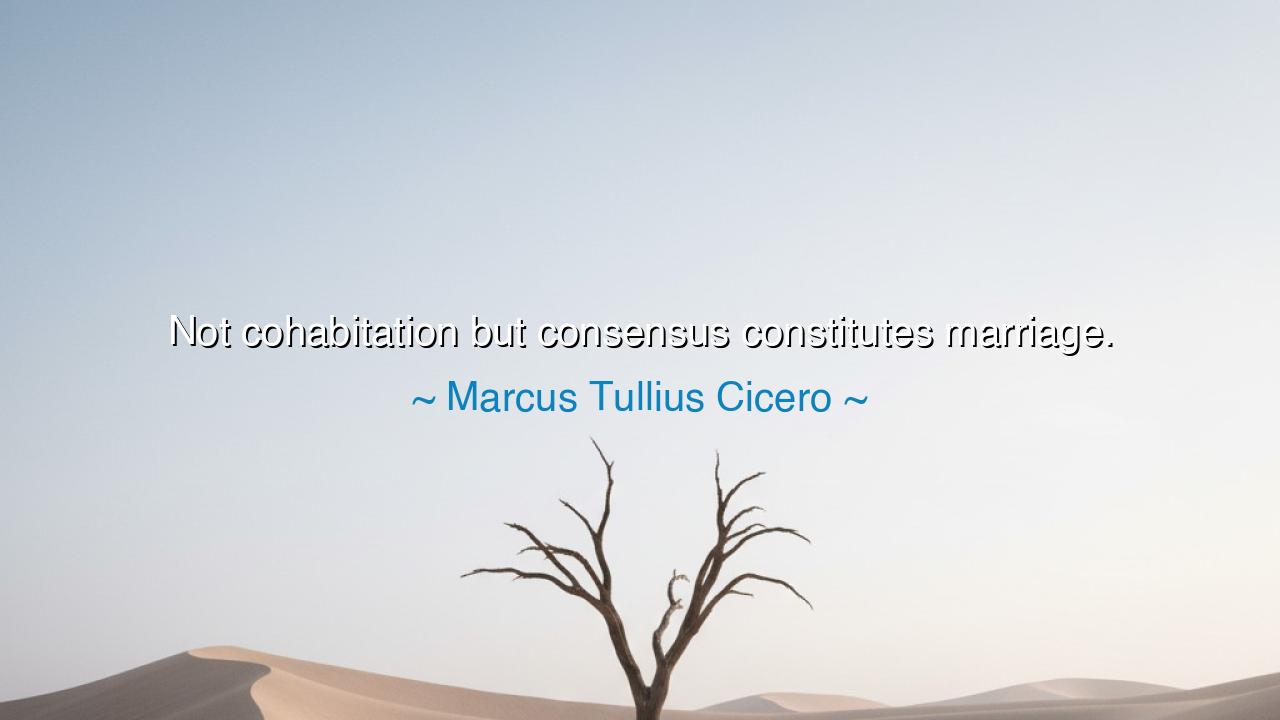
Not cohabitation but consensus constitutes marriage.






The words of Marcus Tullius Cicero — “Not cohabitation but consensus constitutes marriage.” — flow like a quiet stream through the centuries, carrying with them the wisdom of Rome’s golden age. They remind us that true union does not live in walls or roofs, nor in mere proximity of flesh, but in the agreement of minds and harmony of hearts. Cicero, one of the greatest orators and philosophers of the ancient world, understood that the foundation of all enduring bonds is consensus — that sacred accord of will, understanding, and purpose between two souls. To live together is common; to agree together is divine.
Cicero, who lived in the tumultuous final years of the Roman Republic, was a man who believed deeply in law, reason, and virtue. His words on marriage arose not merely from sentiment, but from philosophy. In his time, Rome was a place of grand alliances and fragile loyalties, where marriage often served politics more than love. Yet even amid such a world, Cicero saw clearly that marriage without mutual understanding is but a dwelling shared, not a life shared. To him, the essence of marriage was not cohabitation — the mere physical presence of two bodies under one roof — but consensus, the meeting of intellect and affection in a shared journey of purpose.
When Cicero said these words, he spoke as both a thinker and a husband who had tasted the bitterness of discord. His own marriage to Terentia, once strong, had withered under the weight of difference and miscommunication. They lived together, yet they no longer shared a meeting of hearts. Thus, his statement was not only an ideal but also a confession — an insight carved from experience. For in his world, as in ours, many mistake proximity for intimacy. They believe that to inhabit the same house is to be united, when in truth, only mutual consent of spirit makes a union whole.
The ancients knew that even the gods blessed marriages not for their luxury, but for their harmony. The goddess Concordia, whose temple stood in the heart of Rome, symbolized unity — not forced agreement, but balance and peace between differing wills. In this, Cicero’s wisdom shines: he does not call for uniformity, but for agreement born of respect. Consensus does not mean that two souls must be identical in thought; it means they must honor their differences with grace, finding common purpose despite them. For where there is consensus, there is trust, and where there is trust, love takes root.
Consider, then, the example of Pericles and Aspasia of Athens, whose partnership was famed even among their rivals. She was a philosopher, he a statesman; their bond defied convention, for she was not his lawful wife by Athenian decree. Yet theirs was a union of minds so profound that Socrates himself spoke of her wisdom. They lived not by law but by consensus — and though the world might have denied their marriage, the essence of Cicero’s teaching declares it real. For no law or contract can sanctify what the heart does not consent to, and no distance or difference can destroy what two souls have chosen freely.
Cicero’s wisdom also offers warning. When marriages crumble, it is not usually because bodies part ways, but because minds and spirits do. When consensus dies — when understanding fades, and conversation gives way to pride — even the grandest house becomes a cold chamber. To restore such a union is not to build new walls, but to rekindle the old covenant of respect and empathy. Marriage, then, is not a physical arrangement but a moral and spiritual discipline — a daily choice to agree, to listen, to yield, and to stand together.
So, my children, take this lesson to heart: marriage is not a matter of habitation but of harmony. It is not about living side by side, but about thinking side by side. Do not seek a partner merely to fill your home; seek one whose heart can dwell beside yours in peace. And when differences arise, as they must, remember that the strength of a union lies not in victory, but in understanding. Build consensus not through command, but through compassion.
For as Cicero teaches, the truest marriage is not of bodies but of souls — not maintained by law, but by love’s daily agreement. To live together is easy; to agree together is the art of eternity. If you would make your bond unbreakable, let your hearts speak truth, let your minds find unity, and let your spirits choose, again and again, the sacred consensus that constitutes marriage.






AAdministratorAdministrator
Welcome, honored guests. Please leave a comment, we will respond soon